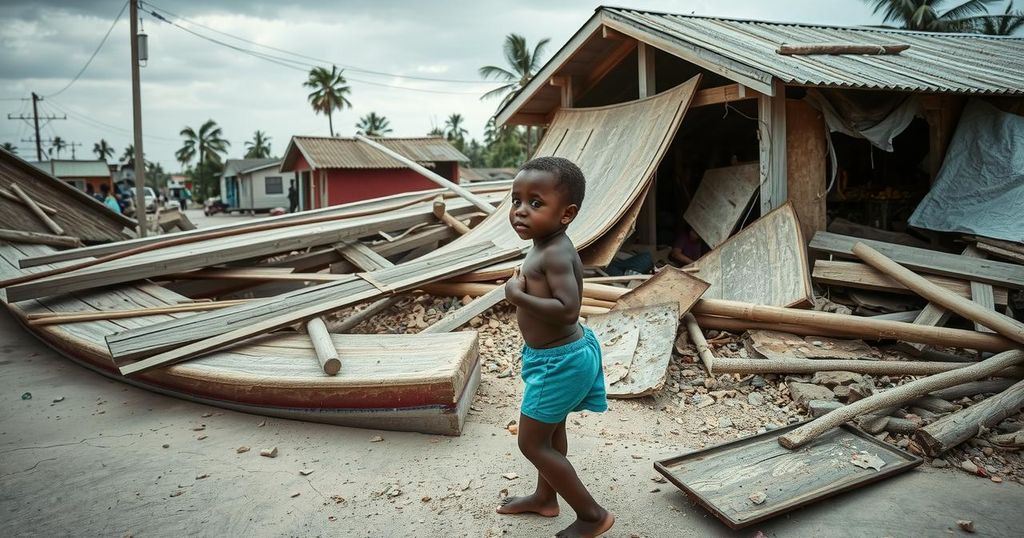Cyclone Chido: 90,000 Children Affected in Mozambique’s Devastation

Tropical Cyclone Chido has severely affected northern Mozambique, impacting nearly 90,000 children and destroying over 35,000 homes. With heightened risks of disease outbreaks and existing conflict, UNICEF and other UN agencies are responding to urgent humanitarian needs. The cyclone also caused damage in nearby provinces and regions, necessitating immediate assistance for affected communities.
Tropical Cyclone Chido has wreaked havoc across northern Mozambique, particularly in Cabo Delgado province, adversely affecting around 90,000 children, as reported by the United Nations Children’s Fund (UNICEF). Initial assessments indicate that more than 35,000 homes have been either destroyed or significantly damaged by the cyclone, which also led to the demolition of 186,000 classrooms and the impairment of 20 health facilities since making landfall on Sunday.
The cyclone’s impact extends beyond immediate physical destruction, with at least 174,000 individuals broadly affected. The storm’s effects are particularly dire considering that the region has been grappling with severe social issues, including longstanding conflict, drought, and disease outbreaks that have previously threatened the well-being of children. “Mozambique is considered one of the most affected countries in the world by climate change,” remarked Mary Louise Eagleton, UNICEF Representative in Mozambique.
The province of Cabo Delgado has experienced more than seven years of violent conflict, resulting in the internal displacement of over 1.3 million individuals, predominantly women and children. The aftermath of Cyclone Chido exacerbates the existing hardships in the region, diminishing previous recovery efforts. Additional areas affected include Nampula and Niassa provinces, where over 25,000 families remain without electrical services.
Given that the region is currently managing a cholera outbreak, there is heightened concern regarding the worsening health situation following the cyclone. The World Health Organization (WHO) has dispatched experts to perform health assessments in the affected areas to address urgent needs.
In response to the unfolding crisis, the UN refugee agency, UNHCR, has commenced immediate emergency relief efforts in Pemba, providing essential items to over 2,600 individuals within the first two days following the cyclone. However, significant challenges persist due to limited supplies necessary for an adequate humanitarian response. Emergency Relief Coordinator Tom Fletcher has allocated $4 million to initiate humanitarian efforts in Mozambique.
In addition to Mozambique, Cyclone Chido caused substantial destruction in Mayotte, a French overseas territory, as well as in southern Malawi, with impacts on vulnerable groups, including asylum-seekers and refugees. The UN Secretary-General, António Guterres, confirmed the readiness of UN teams in the region to provide further emergency assistance as needed.
Cyclone Chido is a recent tropical storm that struck northern Mozambique, causing unprecedented destruction in Cabo Delgado province. This storm occurred against the backdrop of an already dire humanitarian scenario, characterized by climate change, internal conflict, and public health crises. The region had been grappling with these long-standing issues, resulting in heightened vulnerability among its population, particularly children. The cyclone’s impacts have only intensified pre-existing challenges, making the response efforts even more critical.
In conclusion, Cyclone Chido has significantly impacted northern Mozambique, particularly affecting children’s safety and well-being. The extensive destruction of homes and infrastructure has exacerbated an already fragile situation characterized by conflict and health crises. Immediate humanitarian assistance is crucial to aid those affected, and UN agencies are mobilizing to address these urgent needs, highlighting the importance of continued support and resources.
Original Source: news.un.org






